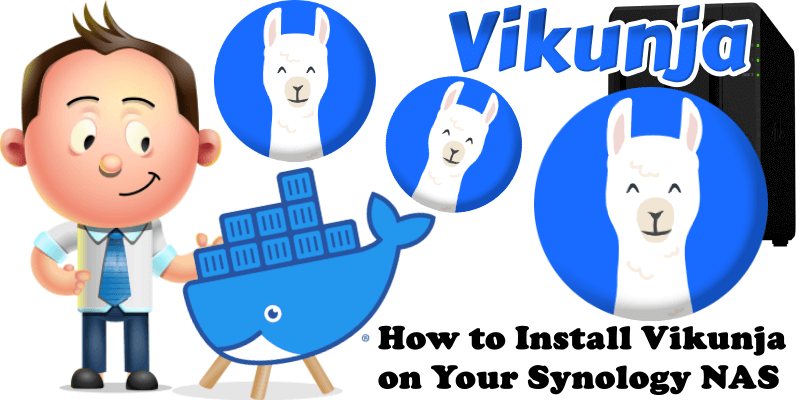
Vikunja is an open source, selfhosted application. With Vikunja you can easily organize all of your tasks in lists. Put lists together in a namespace to keep related stuff grouped together. Vikunja lets you easily share a list or a namespace with another user or a whole team! You can also assign tasks to people so everybody knows who’s working on what. In this step by step guide I will show you how to install Vikunja on your Synology NAS using Docker and Portainer.
STEP 1
Please Support My work by Making a Donation.
STEP 2
Install Portainer using my step by step guide. If you already have Portainer installed on your Synology NAS, skip this STEP. Attention: Make sure you have installed the latest Portainer version.
STEP 3
Make sure you have a synology.me Wildcard Certificate. Follow my guide to get a Wildcard Certificate. If you already have a synology.me Wildcard certificate, skip this STEP.
STEP 4
Go to Control Panel / Network / Connectivity tab/ Check Enable HTTP/2 then click Apply. Follow the instructions in the image below.
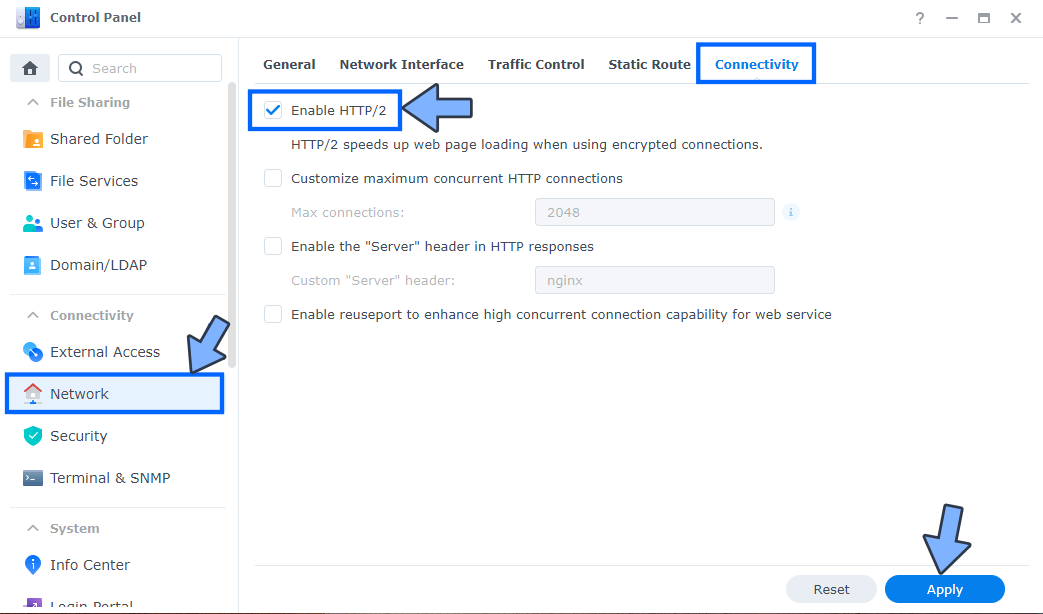
STEP 5
Go to Control Panel / Security / Advanced tab/ Check Enable HTTP Compression then click Apply. Follow the instructions in the image below.
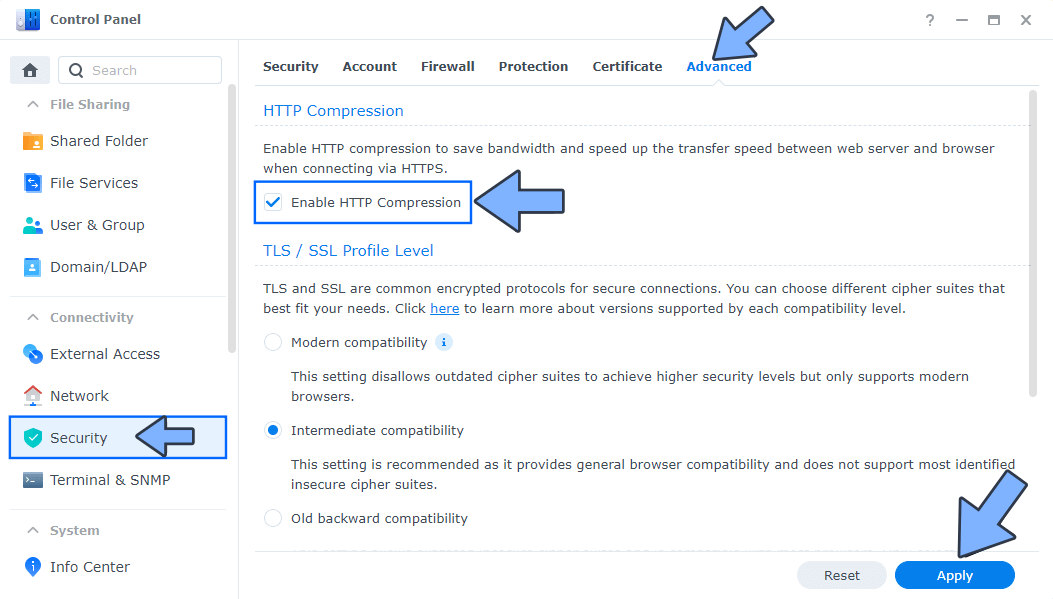
STEP 6
Go to Control Panel / Login Portal / Advanced Tab / click Reverse Proxy. Follow the instructions in the image below.
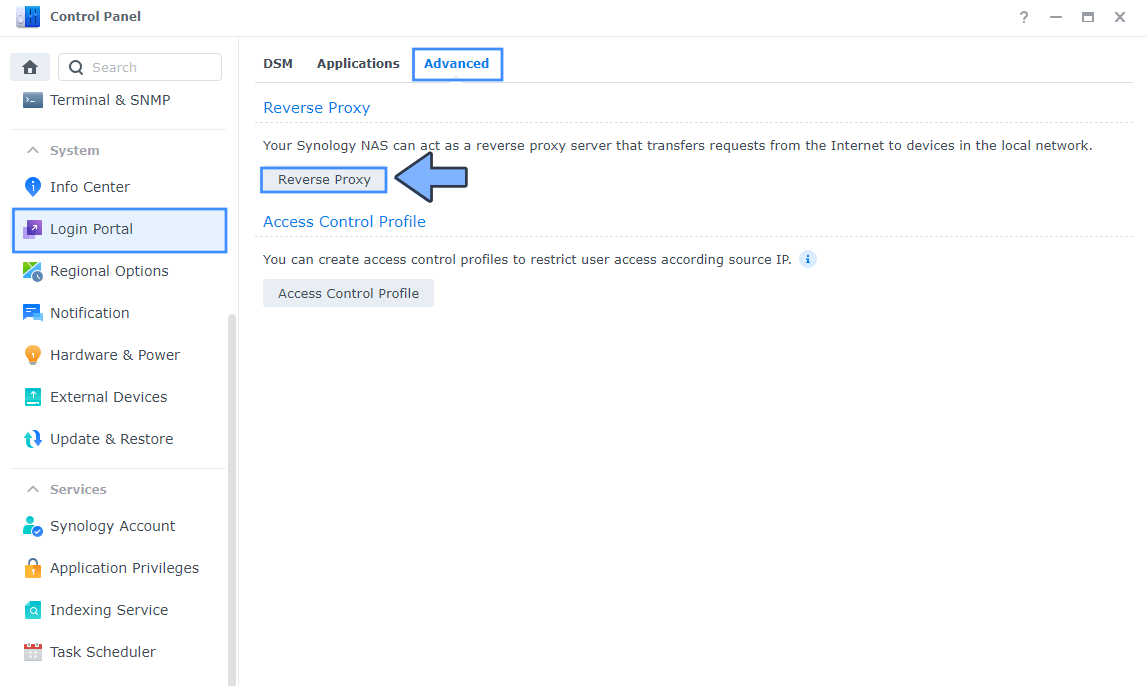
STEP 7
Now click the “Create” button. Follow the instructions in the image below.
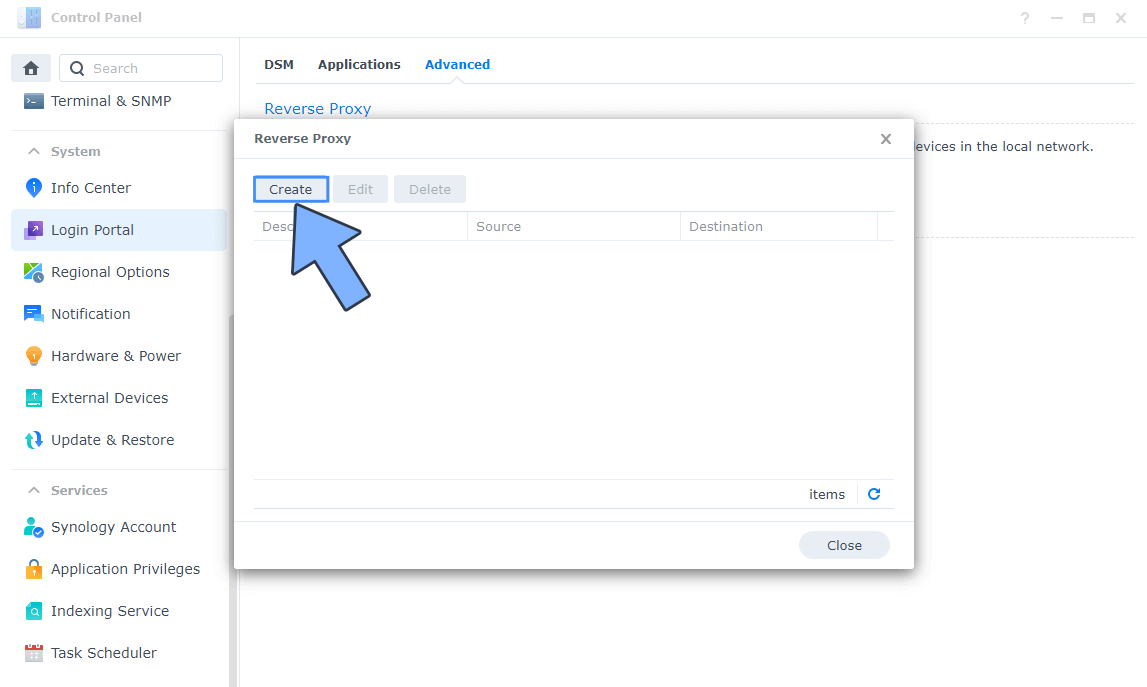
STEP 8
After you click the Create button, the window below will open. Follow the instructions in the image below.
On the General area, set the Reverse Proxy Name description: type in Vikunja. After that, add the following instructions:
Source:
Protocol: HTTPS
Hostname: vikunja.yourname.synology.me
Port: 443
Check Enable HSTS
Destination:
Protocol: HTTP
Hostname: localhost
Port: 3456
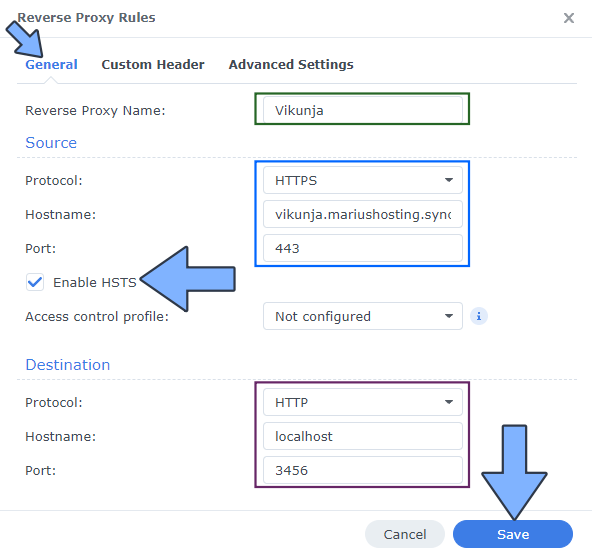
STEP 9
On the Reverse Proxy Rules, click the Custom Header tab. Click Create and then, from the drop-down menu, click WebSocket. After you click on WebSocket, two Header Names and two Values will be automatically added. Click Save. Follow the instructions in the image below.

STEP 10
Go to File Station and open the docker folder. Inside the docker folder, create one new folder and name it vikunja. Follow the instructions in the image below.
Note: Be careful to enter only lowercase, not uppercase letters.
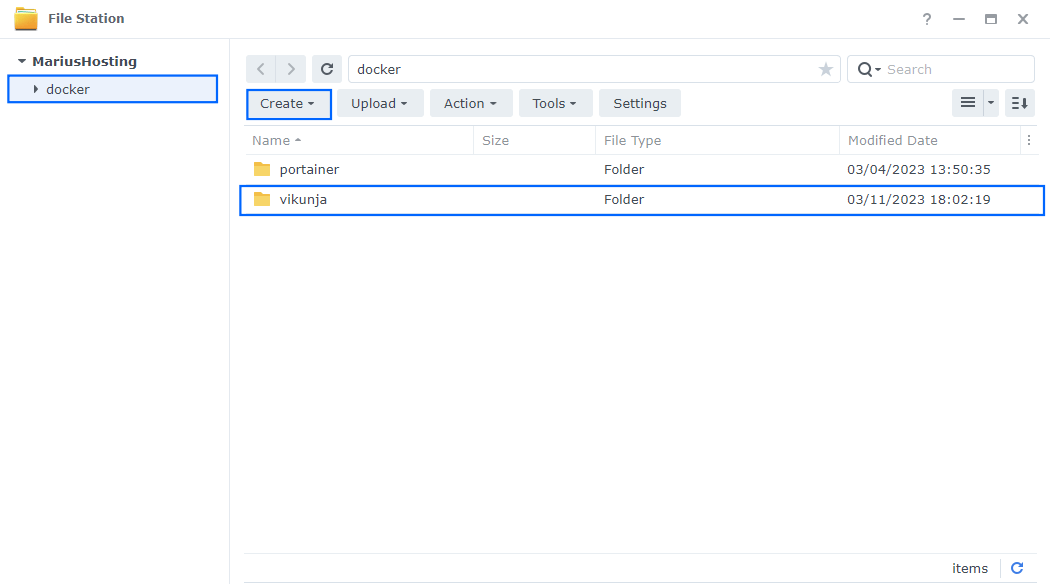
STEP 11
Now create two new folders inside the vikunja folder that you created at STEP 10 and name them data and db. Follow the instructions in the image below.
Note: Be careful to enter only lowercase, not uppercase letters.
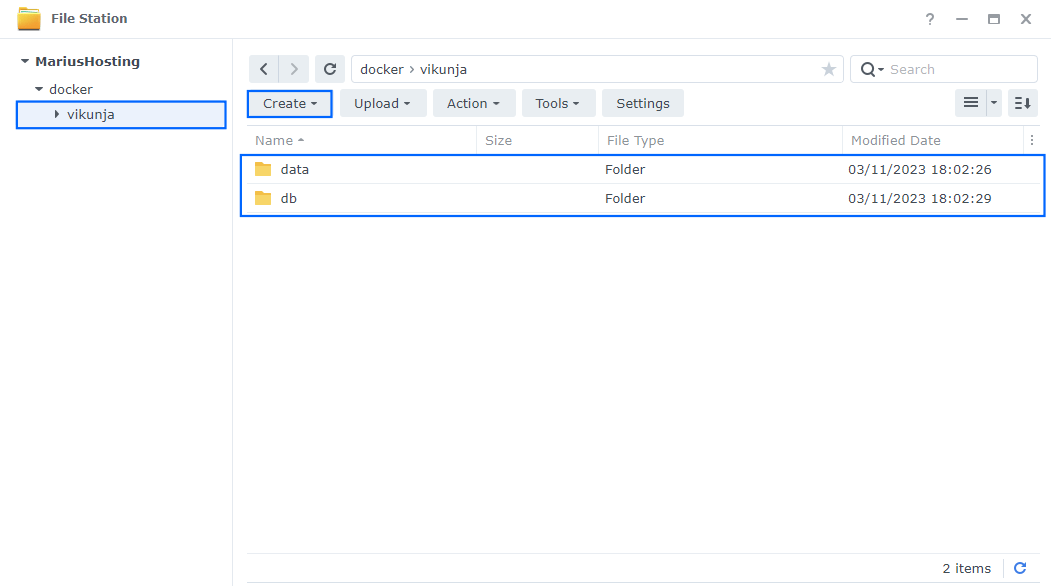
STEP 12
Follow my step by step guide on how to activate SMTP for your Gmail account. This step is mandatory. Note: If you don’t want to use the easiest way for SMTP with Google and you already have SMTP details from your own Mail Server, you can just skip this STEP and use your personalized email SMTP details instead.
STEP 13
Log into Portainer using your username and password. On the left sidebar in Portainer, click on Home then Live connect. Follow the instructions in the image below.

On the left sidebar in Portainer, click on Stacks then + Add stack. Follow the instructions in the image below.

STEP 14
In the Name field type in vikunja. Follow the instructions in the image below.
services:
db:
image: postgres:18
container_name: Vikunja-DB
hostname: vikunja-db
security_opt:
- no-new-privileges:true
healthcheck:
test: ["CMD", "pg_isready", "-q", "-d", "vikunja", "-U", "vikunjauser"]
timeout: 45s
interval: 10s
retries: 10
volumes:
- /volume1/docker/vikunja/db:/var/lib/postgresql:rw
environment:
POSTGRES_DB: vikunja
POSTGRES_USER: vikunjauser
POSTGRES_PASSWORD: vikunjapass
restart: on-failure:5
vikunja:
image: vikunja/vikunja:latest
container_name: Vikunja
hostname: vikunja
security_opt:
- no-new-privileges:true
user: 1026:100
ports:
- 3456:3456
environment:
VIKUNJA_MAILER_ENABLED: true
VIKUNJA_MAILER_HOST: smtp.gmail.com
VIKUNJA_MAILER_PORT: 587
VIKUNJA_MAILER_SKIPTLSVERIFY: false
VIKUNJA_MAILER_AUTHTYPE: login
VIKUNJA_MAILER_USERNAME: Your-own-gmail-address
VIKUNJA_MAILER_PASSWORD: Your-own-app-password
VIKUNJA_MAILER_FROMEMAIL: Your-own-gmail-address
VIKUNJA_DATABASE_HOST: vikunja-db
VIKUNJA_DATABASE_PASSWORD: vikunjapass
VIKUNJA_DATABASE_TYPE: postgres
VIKUNJA_DATABASE_USER: vikunjauser
VIKUNJA_DATABASE_DATABASE: vikunja
VIKUNJA_SERVICE_JWTSECRET: dOxZYTTZgXKMHkqLBIQVImayQXAVWdzGBPuFJKggzcgvgPJPXpWzqzKaUOIOGGIr
VIKUNJA_SERVICE_TIMEZONE: Europe/Bucharest
VIKUNJA_SERVICE_PUBLICURL: https://vikunja.yourname.synology.me/
VIKUNJA_SERVICE_ENABLEREGISTRATION: true
volumes:
- /volume1/docker/vikunja/data:/app/vikunja/files:rw
restart: on-failure:5
depends_on:
db:
condition: service_healthy
Note: Before you paste the code above in the Web editor area below, change the value numbers for user with your own PUID and PGID values. (Follow my step by step guide on how to do this.) 1026 is my personal UID value and 100 is my personal GID value. You have to type in your own values.
Note: Before you paste the code above in the Web editor area below, change the value for VIKUNJA_MAILER_USERNAME and type in your own Gmail address. Refer to STEP 12.
Note: Before you paste the code above in the Web editor area below, change the value for VIKUNJA_MAILER_PASSWORD and type in your own Gmail app password. Refer to STEP 12.
Note: Before you paste the code above in the Web editor area below, change the value for VIKUNJA_MAILER_FROMEMAIL and type in your own Gmail address. Refer to STEP 12.
Note: Before you paste the code above in the Web editor area below, change the value for VIKUNJA_SERVICE_JWTSECRET. (Generate your own Random 64 length VIKUNJA_SERVICE_JWTSECRET.)
Note: Before you paste the code above in the Web editor area below, change the value for TZ. (Select your current Time Zone from this list.)
Note: Before you paste the code above in the Web editor area below, change the value for VIKUNJA_SERVICE_PUBLICURL and add your own synology.me DDNS address with https:// at the beginning that you have previously created at STEP 8.
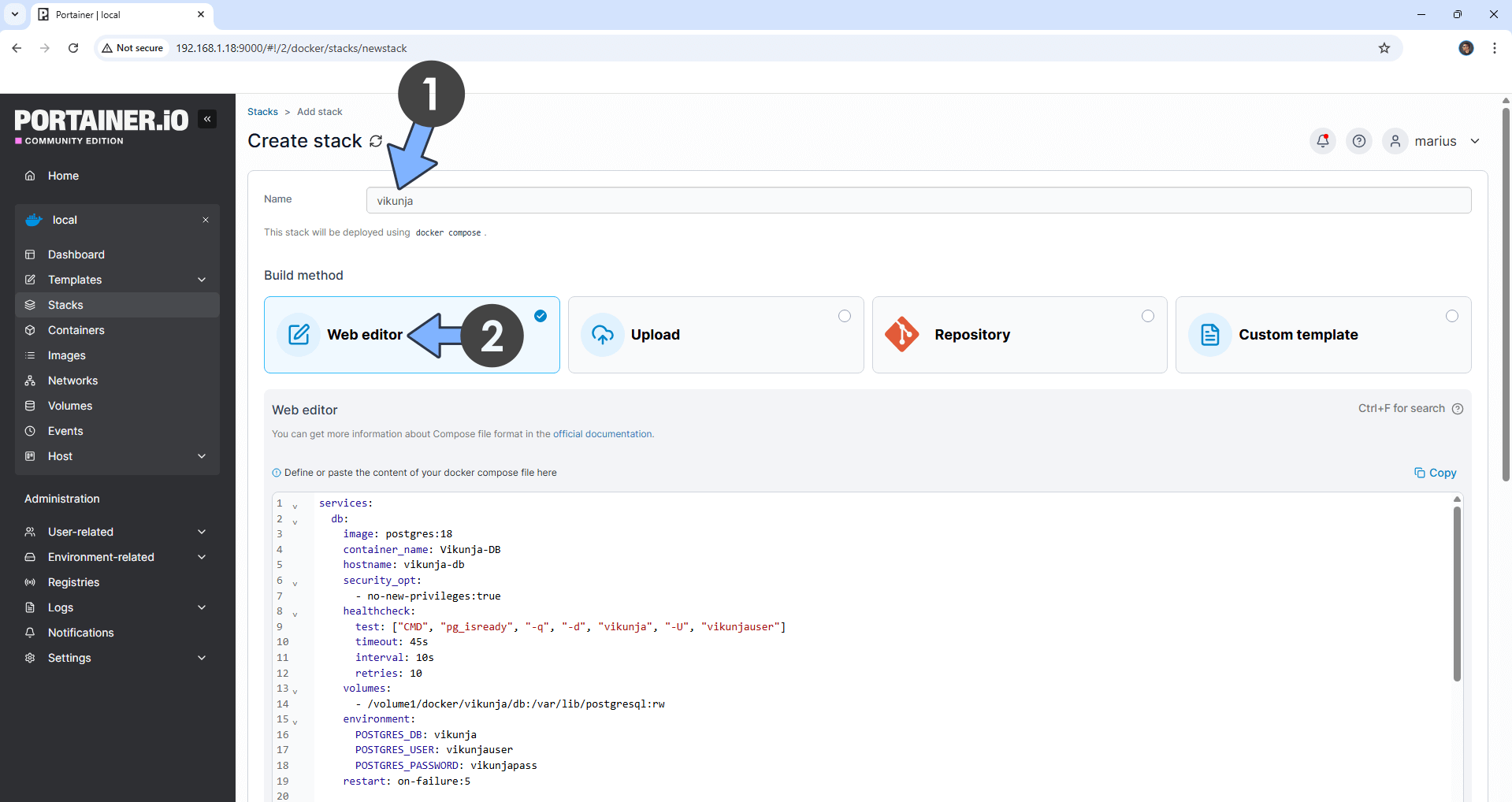
STEP 15
Scroll down on the page until you see a button named Deploy the stack. Click on it. Follow the instructions in the image below. The installation process can take up to a few minutes. It will depend on your Internet speed connection.
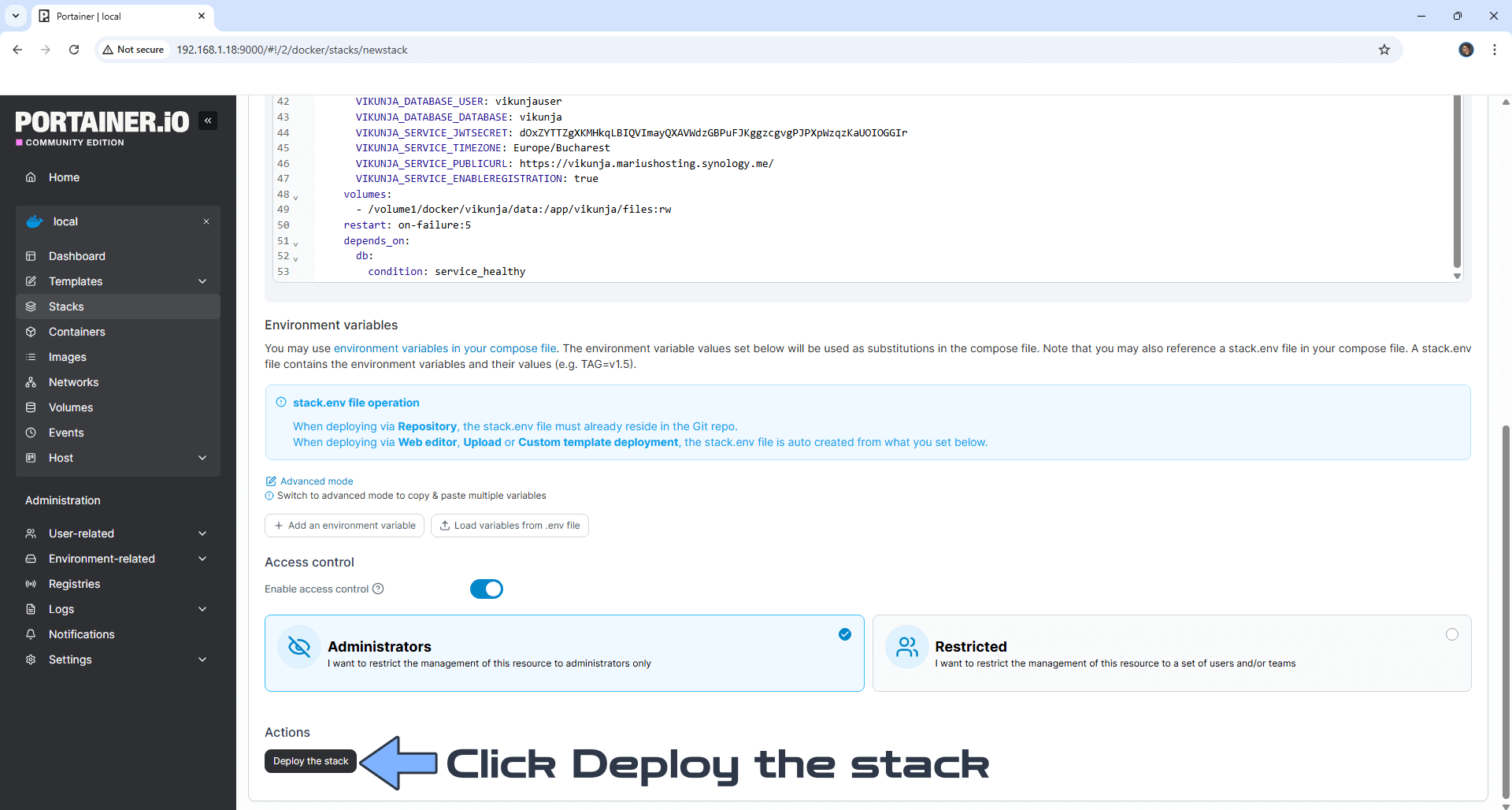
STEP 16
If everything goes right, you will see the following message at the top right of your screen: “Success Stack successfully deployed“.

STEP 17
🟢Please Support My work by Making a Donation. Almost 99,9% of the people that install something using my guides forget to support my work, or just ignore STEP 1. I’ve been very honest about this aspect of my work since the beginning: I don’t run any ADS, I don’t require subscriptions, paid or otherwise, I don’t collect IPs, emails, and I don’t have any referral links from Amazon or other merchants. I also don’t have any POP-UPs or COOKIES. I have repeatedly been told over the years how much I have contributed to the community. It’s something I love doing and have been honest about my passion since the beginning. But I also Need The Community to Support me Back to be able to continue doing this work.
STEP 18
Please wait approximately 2 minutes for the installation to be completed or you will get a Synology blank page if you try to connect too soon. Now open your browser and type in your HTTPS/SSL certificate like this https://vikunja.yourname.synology.me In my case it’s https://vikunja.mariushosting.synology.me If everything goes right, you will see the Vikunja Login page. Click Create Account. Follow the instructions in the image below.
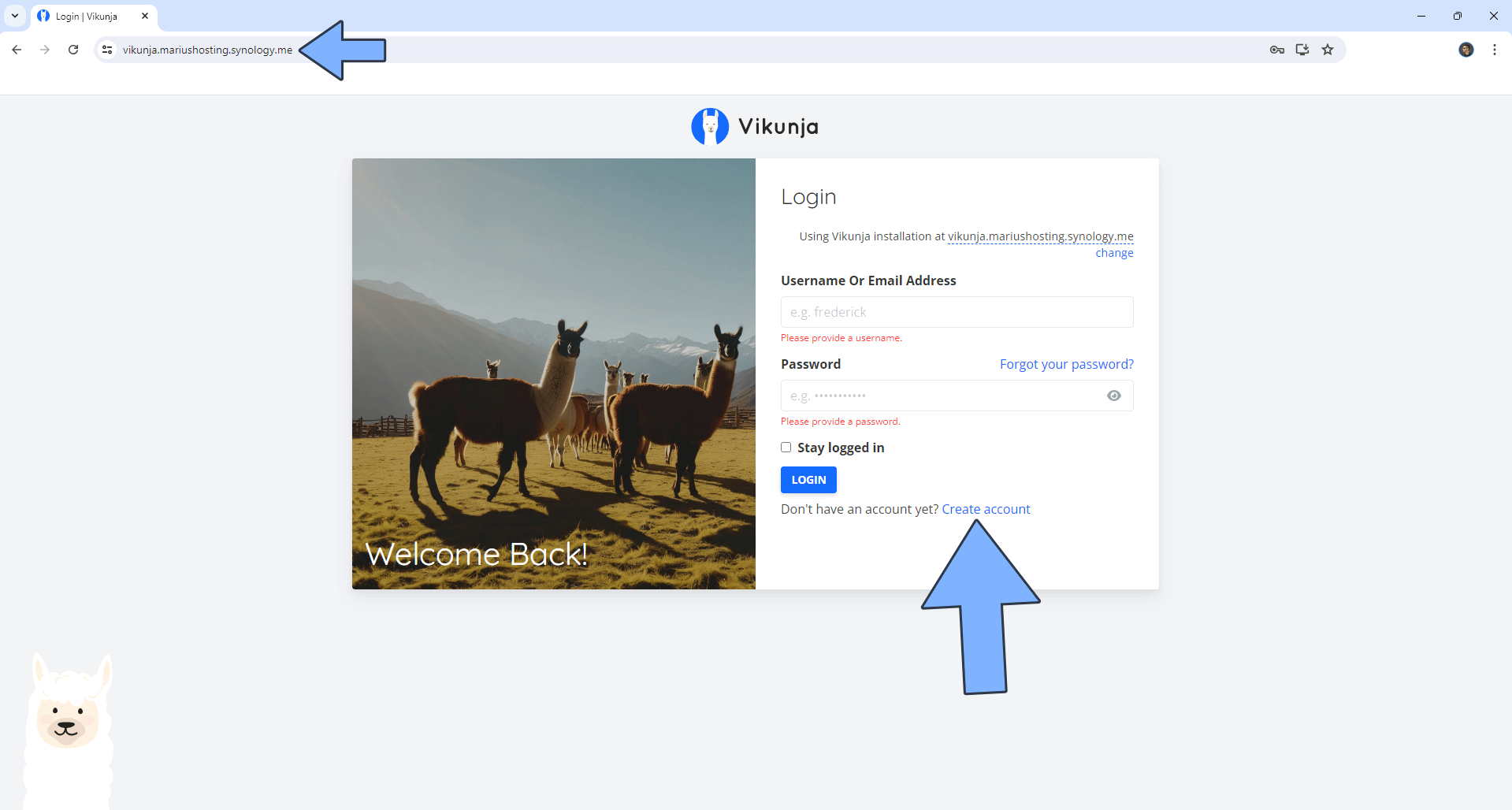
STEP 19
Add your own Username, Email address and Password then hit the CREATE ACCOUNT button. Follow the instructions in the image below.
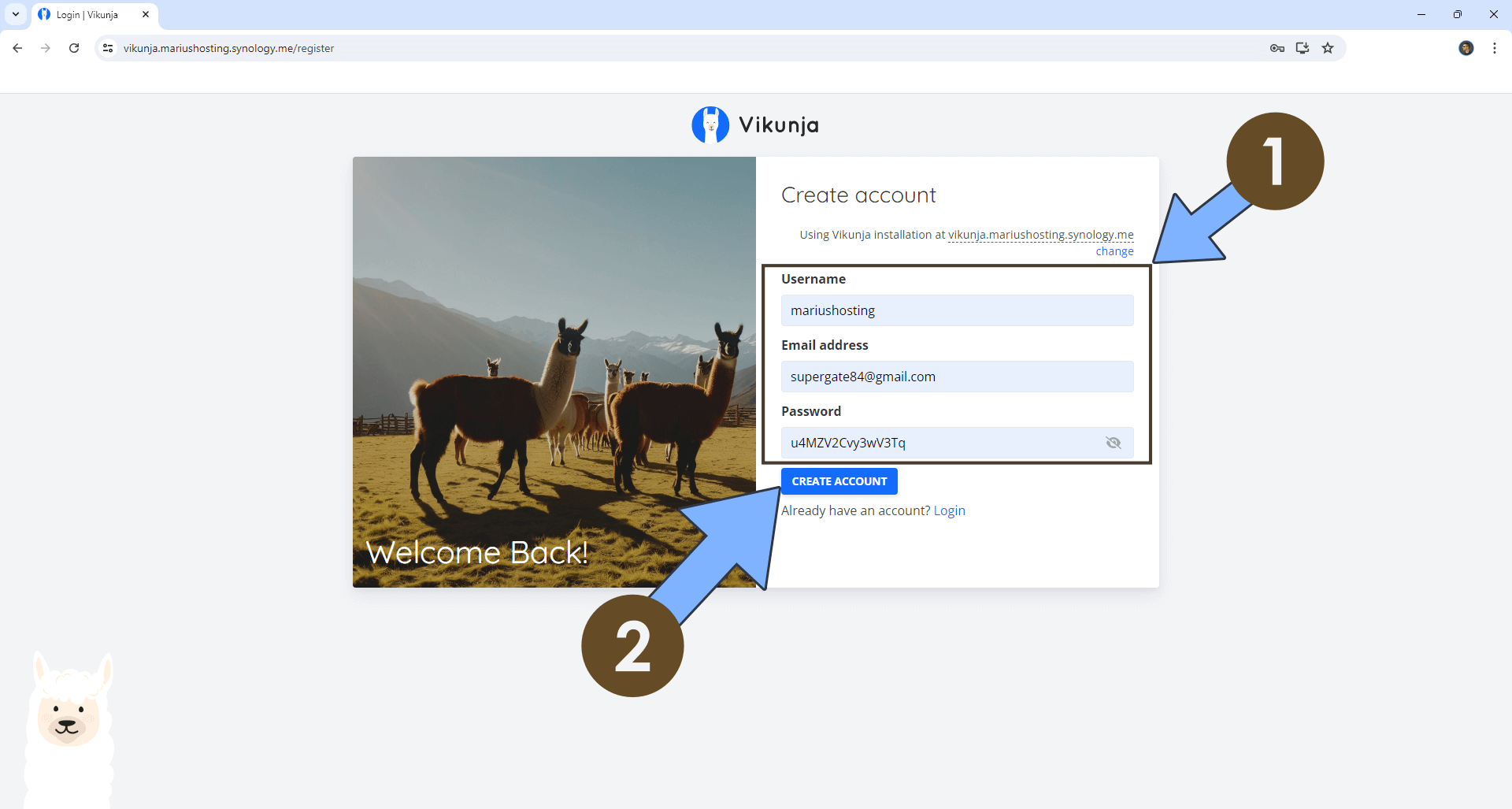
STEP 20
Vikunja at a Glance! Go straight to the next STEP.
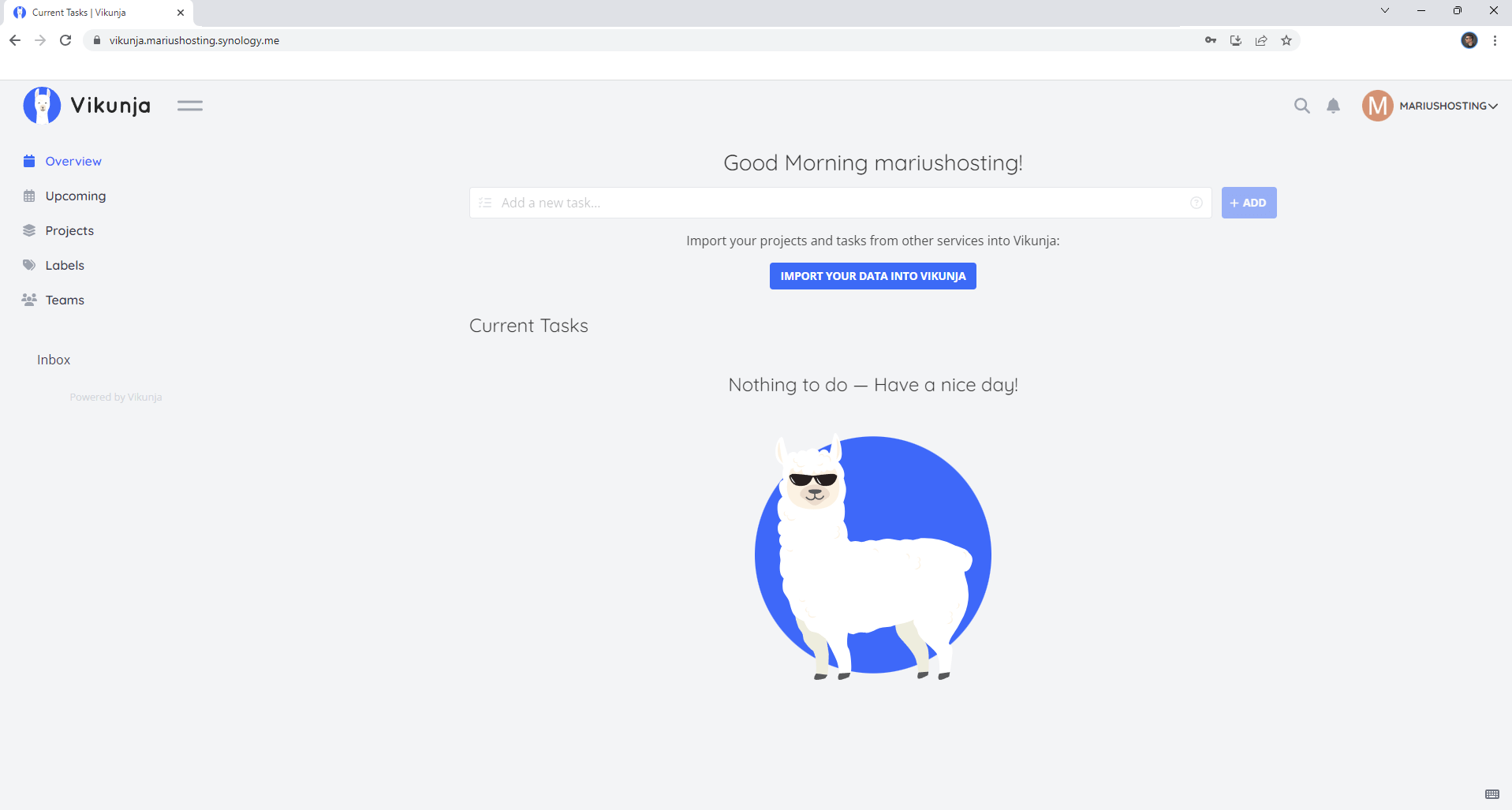
STEP 21
Check your email and confirm your account. Follow the instructions in the image below.
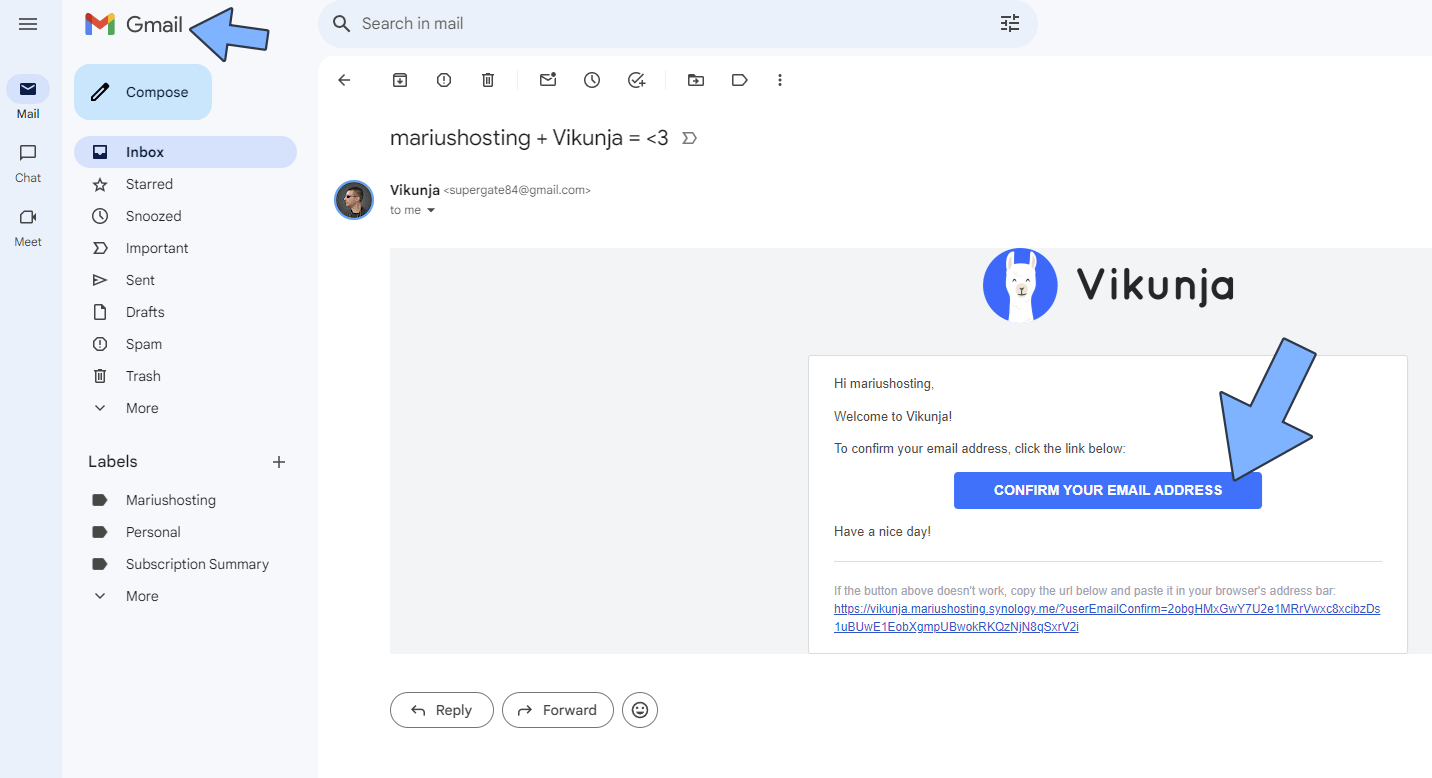
STEP 22
You can change different parameters. At the top right of the page click on your own username, then Settings. Change the Color Scheme, Language, Time Zone etc. Click Save. Follow the instructions in the image below.
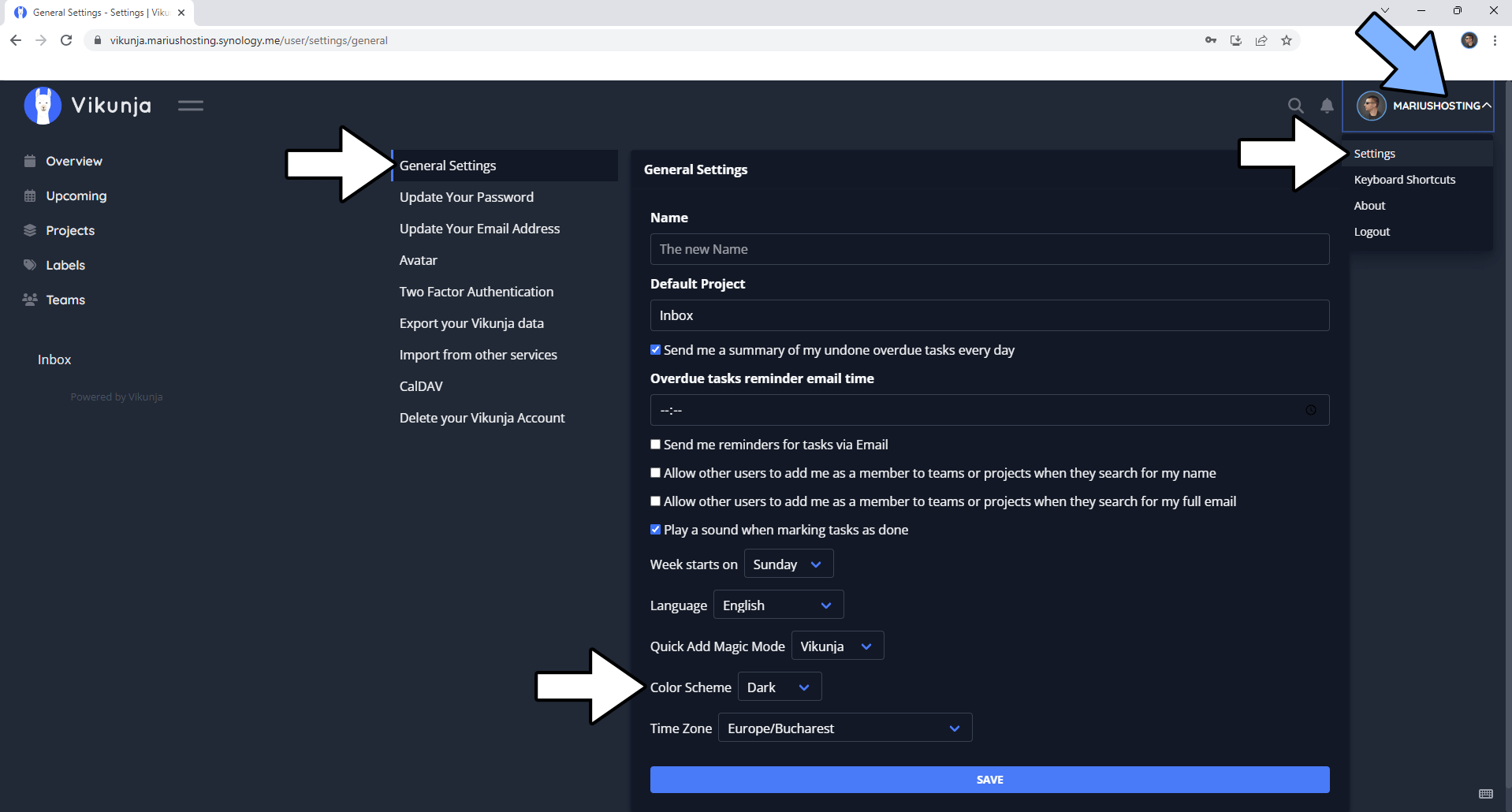
STEP 23
One of the most important things you need to know about Vikunja is that anyone who can access your HTTPS Vikunja link at STEP 18 can register for a new account by default. Follow my step by step guide below to disable registration of new users in Vikunja.
STEP 24
🟢Please Support My work by Making a Donation. Almost 99,9% of the people that install something using my guides forget to support my work, or just ignore STEP 1. I’ve been very honest about this aspect of my work since the beginning: I don’t run any ADS, I don’t require subscriptions, paid or otherwise, I don’t collect IPs, emails, and I don’t have any referral links from Amazon or other merchants. I also don’t have any POP-UPs or COOKIES. I have repeatedly been told over the years how much I have contributed to the community. It’s something I love doing and have been honest about my passion since the beginning. But I also Need The Community to Support me Back to be able to continue doing this work.
STEP 25
Go to Portainer then click Stacks. Click on vikunja. Follow the instructions in the image below.
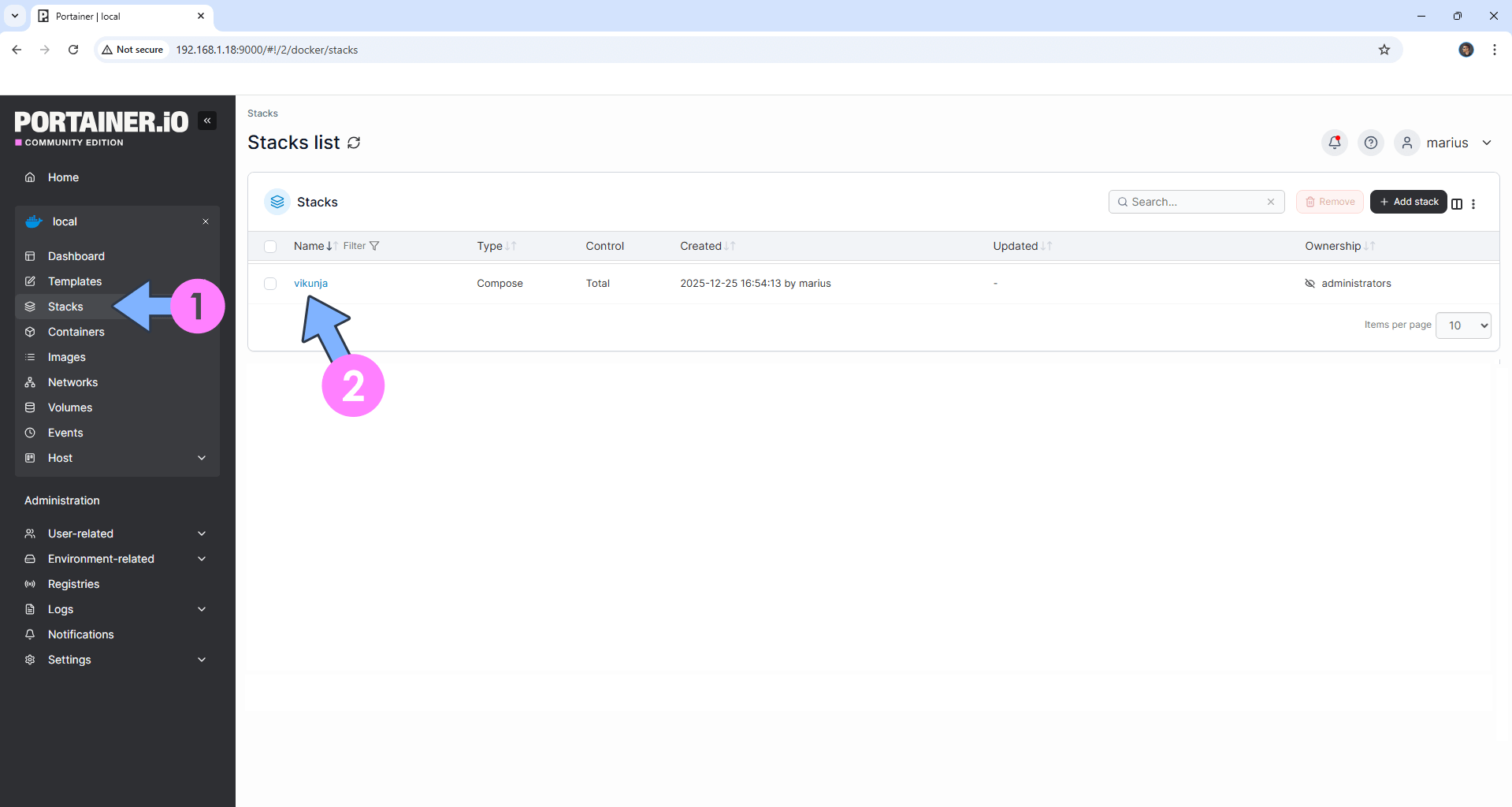
STEP 26
Click on the Editor tab then scroll down the page a little bit. Change the value for VIKUNJA_SERVICE_ENABLEREGISTRATION from true to false then scroll down the page until you find the Update the stack button. Click Update the stack. Follow the instructions in the image below.
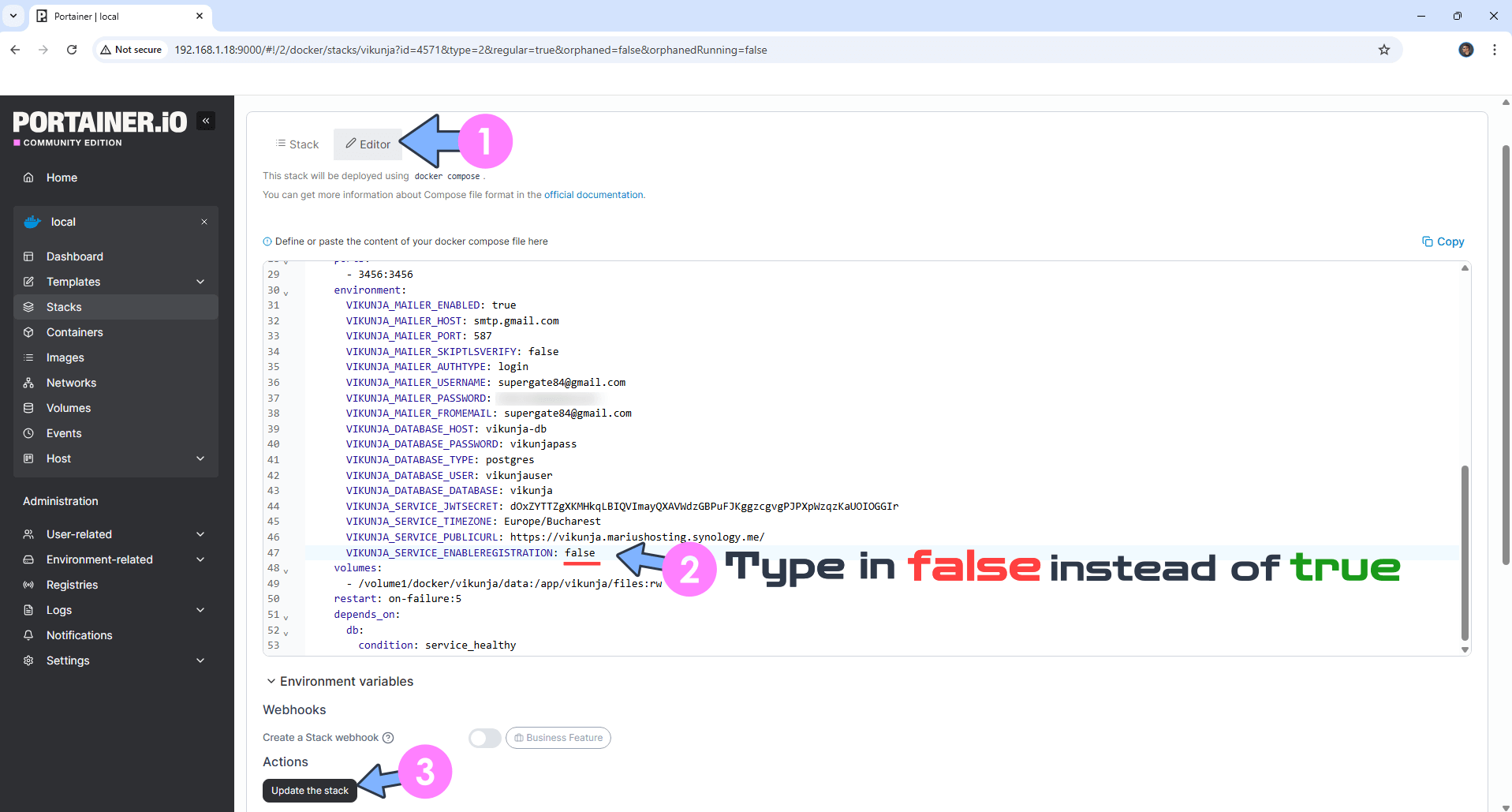
STEP 27
After you click Update the stack at STEP 26, a new pop up window will open. Click Update. Follow the instructions in the image below.
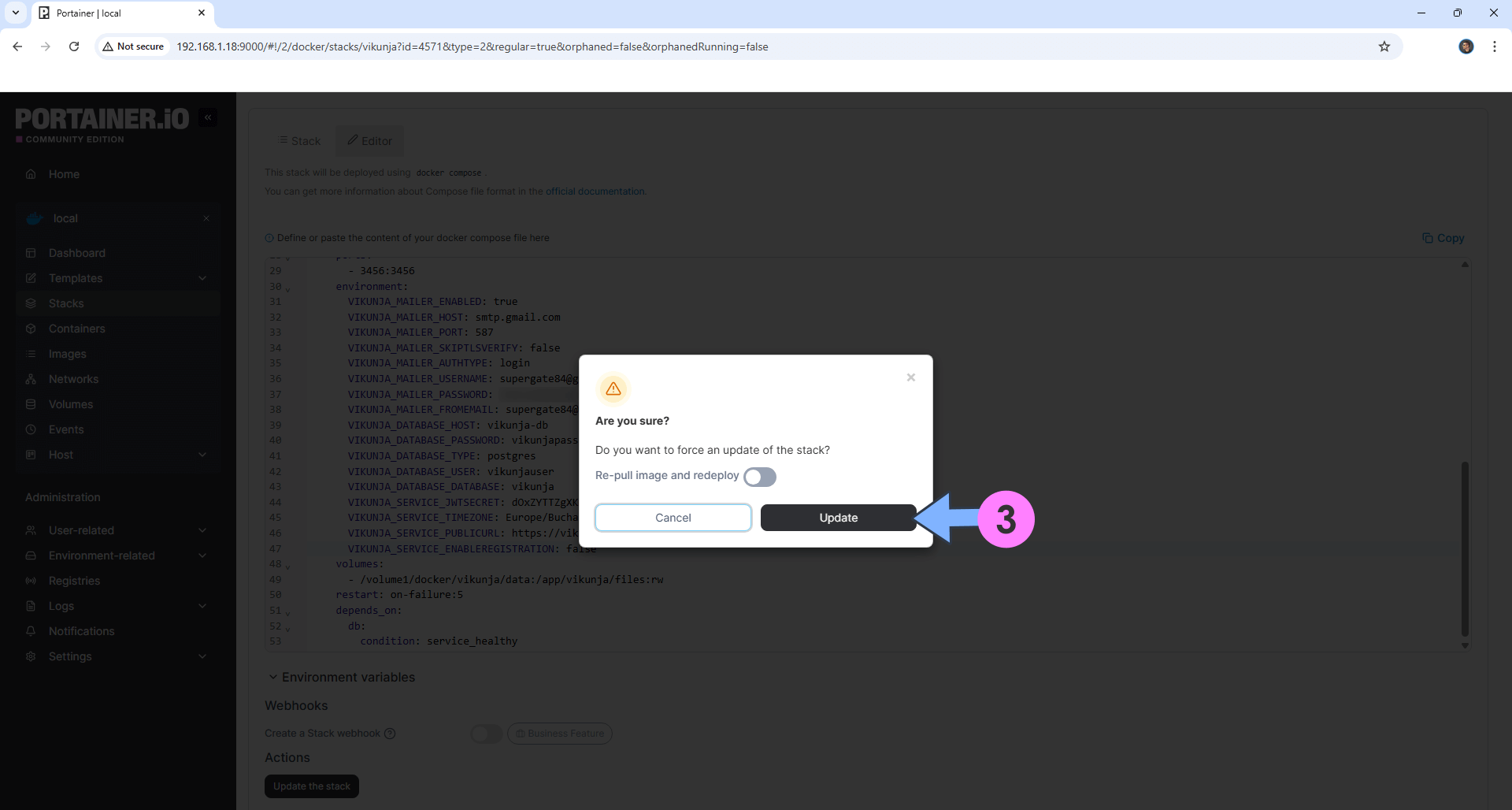
STEP 28
When new users try to register, they will receive the following error message: “Not Found“.
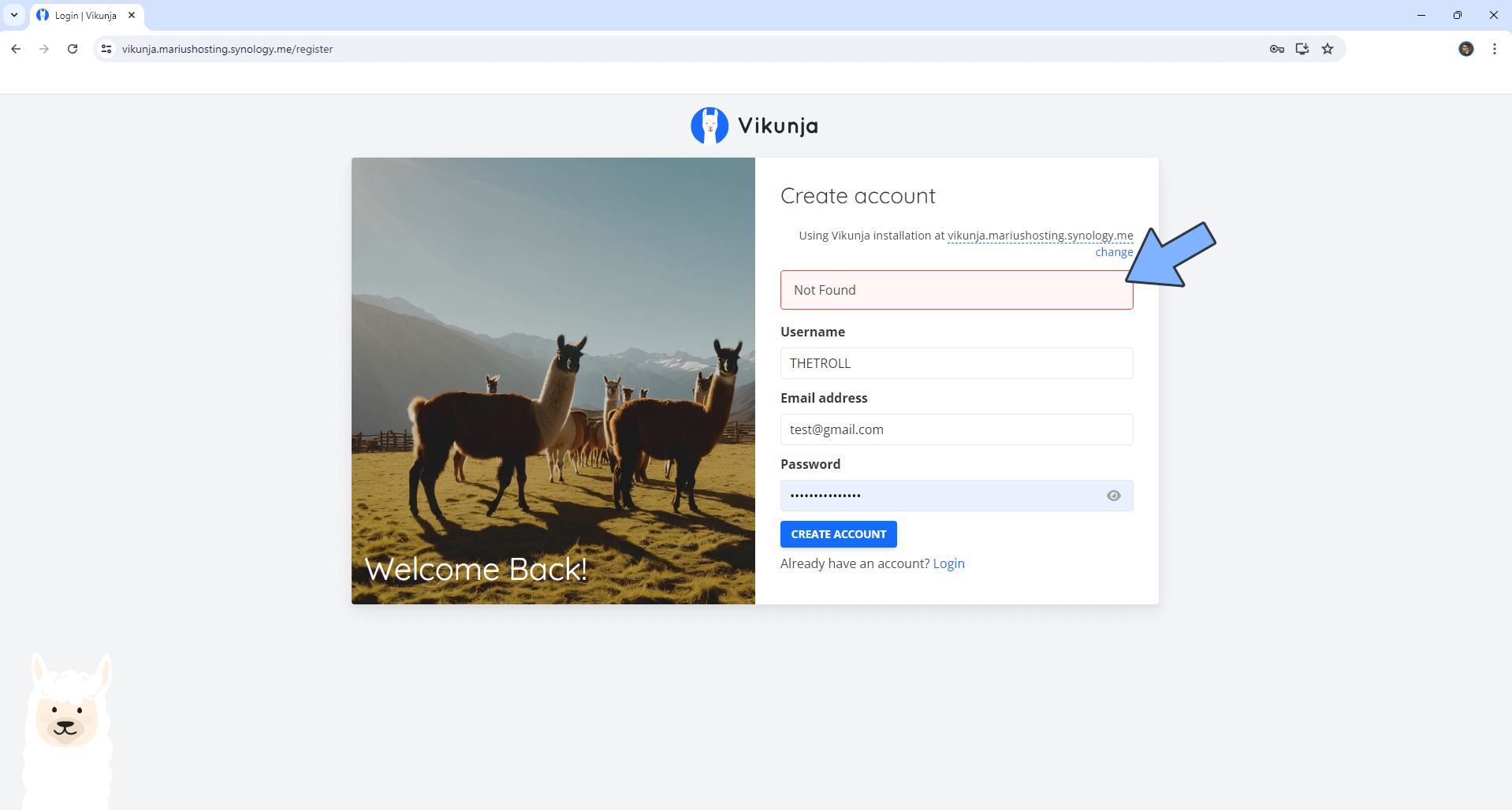
Note: Even if you have change the variable VIKUNJA_SERVICE_ENABLEREGISTRATION with the false value, the Create Account button will still be shown in the Vikunja Login page interface, but actually attempting to create an account will result in an error message.
Enjoy Vikunja!
If you encounter issues by using this container, make sure to check out the Common Docker issues article.
🔥Troubleshooting: If you experience connection issues with Vikunja, make sure RULE 5 and RULE 6 is correctly applied on your Synology NAS Firewall configuration.
Note: Find out how to update the Vikunja container with the latest image.
Note: How to Back Up Docker Containers on your Synology NAS.
Note: Can I run Docker on my Synology NAS? See the supported models.
Note: How to Free Disk Space on Your NAS if You Run Docker.
Note: How to Schedule Start & Stop For Docker Containers.
Note: How to Activate Email Notifications.
Note: How to Add Access Control Profile on Your NAS.
Note: How to Change Docker Containers Restart Policy.
Note: How to Use Docker Containers With VPN.
Note: Convert Docker Run Into Docker Compose.
Note: How to Clean Docker.
Note: How to Clean Docker Automatically.
Note: Best Practices When Using Docker and DDNS.
Note: Some Docker Containers Need WebSocket.
Note: Find out the Best NAS Models For Docker.
Note: Activate Gmail SMTP For Docker Containers.
This post was updated on Friday / February 27th, 2026 at 4:33 PM
